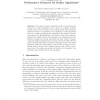Free Online Productivity Tools
i2Speak
i2Symbol
i2OCR
iTex2Img
iWeb2Print
iWeb2Shot
i2Type
iPdf2Split
iPdf2Merge
i2Bopomofo
i2Arabic
i2Style
i2Image
i2PDF
iLatex2Rtf
Sci2ools
160
Voted
WADS
2009
Springer
2009
Springer
A Comparison of Performance Measures for Online Algorithms
This paper provides a systematic study of several proposed measures for online algorithms in the context of a specific problem, namely, the two server problem on three colinear points. Even though the problem is simple, it encapsulates a core challenge in online algorithms which is to balance greediness and adaptability. We examine Competitive Analysis, the Max/Max Ratio, the Random Order Ratio, Bijective Analysis and Relative Worst Order Analysis, and determine how these measures compare the Greedy Algorithm and Lazy Double Coverage, commonly studied algorithms in the context of server problems. We find that by the Max/Max Ratio and Bijective Analysis, Greedy is the better algorithm. Under the other measures, Lazy Double Coverage is better, though Relative Worst Order Analysis indicates that Greedy is sometimes better. Our results also provide the first proof of optimality of an algorithm under Relative Worst Order Analysis.
Related Content
| Added | 25 May 2010 |
| Updated | 25 May 2010 |
| Type | Conference |
| Year | 2009 |
| Where | WADS |
| Authors | Joan Boyar, Sandy Irani, Kim S. Larsen |
Comments (0)

